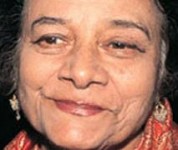Indefatigable diva

Most of us who write on film, TV and radio today are pale shadows of the woman who led the way. Amita Malik was that unusual critic who was a very competitive reporter at the same time, and a confidant interviewer of the accomplished and famous. She combined the reviewer¿s instinct for recognizing a dud, the story getter¿s natural aggression and the TV anchor¿s easy confidence. It was a rare combination. It produced a body of writings on film, radio and television, a number of radio and TV interviews with international film stars and directors, and an engaging autobiography of a colourful life. She was enough of a specialist to sit on film juries at home and abroad, and pull off an interview with a notoriously interview-hating Igmar Bergman. And enough of a news reporter to wangle interviews with people ranging from Indira Gandhi to Nirad Chaudhuri to Shiekh Mujibur Rehman. Her other book, called The Year of the Vulture, was on
The story of her life as told by her was always dramatic. As a newborn babe in
Her unsparingly frank autobiography, Amita, No Holds Barred, is equally a record of her personal and professional life. Her husband worked in All India Radio, and she blithely undertook to write a radio column critiquing what AIR put out. Iqbal Malik thought no good would come of this, and he was right. She made enemies, for him and for herself. Through the reminiscences emerge portraits of those who ran the government media in the fifties and sixties, some small and petty, some thoroughly professional. Hers was turbulent marriage, but despite its eventual collapse, Malik remained the love of her life. When either fell ill in the years after they separated, the other would move in to help out. Shortly before he died, she brought him home to nurse him.
She was certainly
Her writing style was sharp and personal, and she captured truths about a shallow media with acuity. Her immortal caricature of Doordarshan announcers was to describe them as looking as if they were always rushing to a wedding. When she would swing into venues of press conferences tyres screeching, government flunkies scattered in consternation.
She both made and destroyed careers. As satellite TV channels multiplied all of them craved a leading critic¿s attention. Some she wrote about frequently, inviting charges of bias, some she damned with a passing swipe, others she simply ignored.You cannot be a professional critic if you are afraid to lose friends, or be unpopular. Amita Malik never shrank from being acerbic. In the process she discovered who could take criticism and who could not. Sometimes it unsettled her. She would ring up and describe how a star TV couple had called to berate her for her critical comments. And then overcome the hurt to chuckle about it.
In Amita Malik¿s life there was no clear divide between the professional and the personal. Those she wrote about were also those whom she called up to chat with, to whom she offered advice and a shoulder when they needed it, and whom she socialized with. TV channel proprietors and cinema house owners were friends. As were fellow critics whom she rang up to compare notes with on TV programmes, as much as she called to gossip or discuss food and restaurants. In her older years young TV anchors would offer help with personal chores, attend her birthday parties, and invite her to theirs. She made many of their reputations, sometimes drawing attention to a talented novice, sometime building up someone we thought wasn¿t worth the praise.
She loved good food, a good fight, and was gutsy always. When Mark Tully tried to ensure that her on-air criticism of him would not be aired on Doordarshan she took the fight all the way up to Indira Gandhi and won. Till the end, in her book a special occasion would call for red lipstick and a bright red sari. In her final years she licked leukemia to continue writing till a month before she died. Just days before she took seriously ill and was hospitalised, she was spotted at the India International Centre bar. Amita Malik at 87 was far feistier than most of us will ever be at a much younger age.






